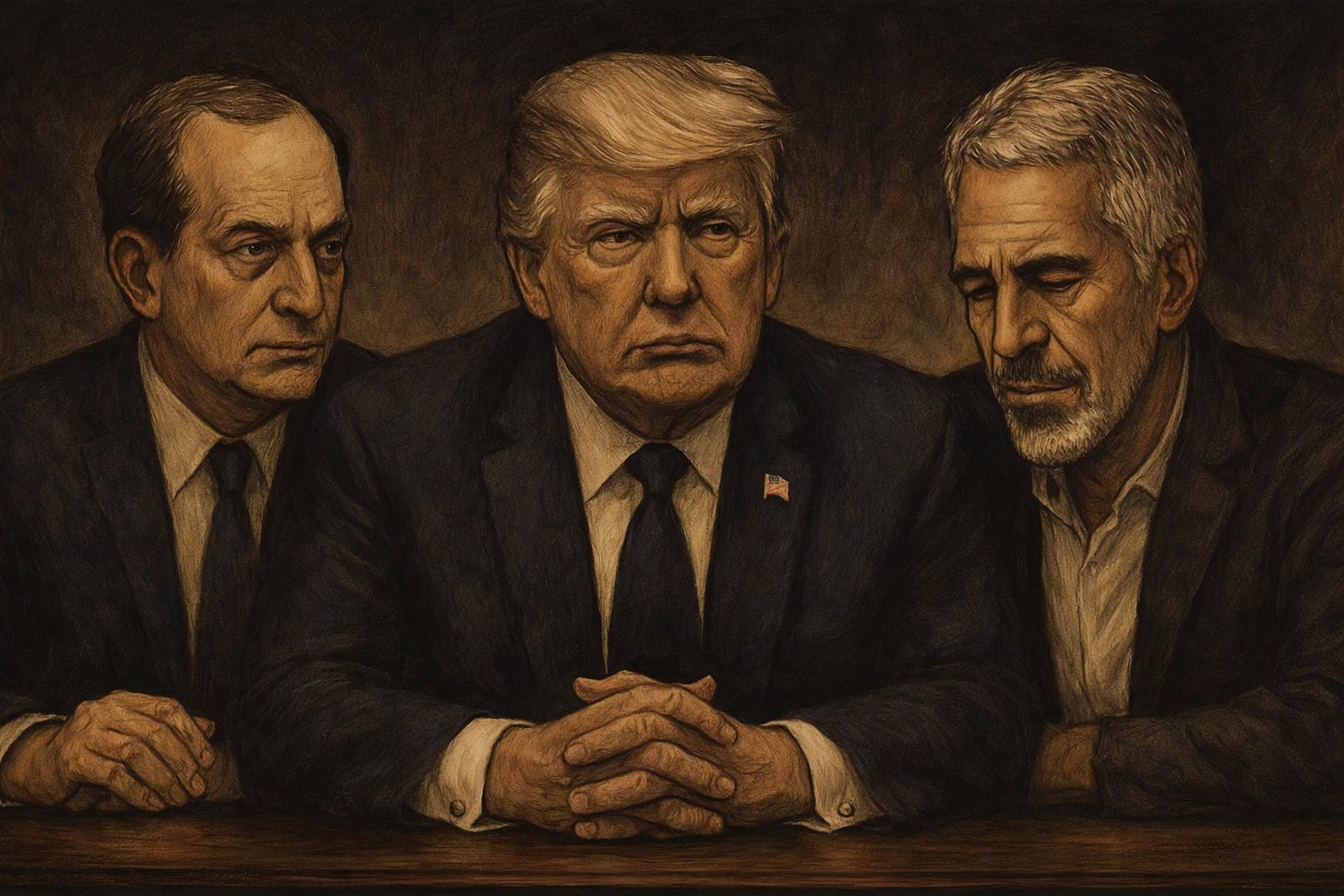Acosta, Trump, Epstein
A dealmaker, a president, and a predator — all on the same page.
There’s something broken in how we remember power.
The timeline problem keeps surfacing like a glitch in the matrix of political memory. Senator Markwayne Mullin’s insistence that Jeffrey Epstein’s plea deal happened under Obama, when Bush was president, feels less like a simple mistake and more like watching someone methodically rewrite history in real-time.
It’s the certainty that gets you.
Not the fumbling around dates or the initial confusion, but the doubling down. The way Mullin pushed back against Jake Tapper’s corrections, as if sheer conviction could bend the calendar backwards. June 2008. Bush in office. Alex Acosta, Bush appointee, negotiating the deal. These aren’t contested facts hiding in some classified vault. They’re right there.
But maybe that’s the point. The plea deal itself remains one of those moments where justice malfunctioned spectacularly. Eighteen months for what could’ve been life. Work release that let Epstein leave jail twelve hours a day. The whole thing reading like a masterclass in how power negotiates with power.
The confusion around 2009 almost makes sense if you squint. That’s when the non-prosecution agreement got unsealed, when people started seeing what had been arranged behind closed doors. Memory does strange things with trauma timelines. Compresses some parts, stretches others. Except senators on national television aren’t supposed to operate on vibes and half-remembered headlines.
And yet.
This systematic erasure of the Bush years from conservative memory feels familiar now, doesn’t it? Afghanistan becomes Biden’s failure. The financial crisis gets pinned on Obama. Now Epstein’s sweetheart deal migrates forward in time, another inconvenient fact reassigned to more politically useful coordinates.
It’s not just lying anymore.
The list of names and convictions sits heavy in the discourse. Republican officials, activists, donors. Not just accusations but guilty pleas, prison sentences, documented patterns. Each entry its own small apocalypse for someone, somewhere.
There’s something particularly galling about Acosta’s trajectory. From architecting Epstein’s deal to Trump’s Secretary of Labor. The symbolism so perfect it feels scripted. Power recycling its own, competence in one area qualifying you for advancement regardless of the wreckage left behind.
Marie Villafana called it deep, implicit institutional biases. The kind of phrase that sounds bloodless until you think about what it actually means. The machinery tilting, ever so slightly, toward certain outcomes. Toward certain people. The prosecutor who wanted justice watching it slip away through something almost worse than conspiracy: the normal functioning of systems never designed to hold certain people accountable.
The attempt to blame Obama reveals more than any confession could. The new move is complete temporal displacement. If you can’t defend what happened, simply relocate it to someone else’s watch. Make the other side waste time on basic chronology while you’ve moved on to the next fabrication.
The Prima Nocta parallel feels both ancient and immediate. That old presumption of access, dressed up in modern clothing. The modeling agencies, the pageants, the parties. Different staging, same fundamental assertion. Because the structures exist to facilitate it. Because consequences, when they finally come, arrive as negotiations between lawyers rather than justice.
You wonder what it does to a culture, this persistent rewriting.
Not just the lies but the casual confidence. The way Mullin seemed genuinely affronted by correction, as if Tapper was playing games with facts. That’s the real innovation. Appearing wounded when others won’t join you in the denial.
The MAGA fantasy world construction makes a terrible kind of sense. If facts belong to the enemy, then more evidence makes you more suspect. It’s a closed loop, perfect in its dysfunction. Every correction becomes proof of conspiracy. The mob mentality doesn’t need truth when it has certainty.
But underneath all the timeline confusion and political theater, there’s still that fundamental violation.
A plea deal that let a serial predator operate for another decade. Victims who watched their abuser walk free most days, building his fortune, expanding his network. The institutional biases Villafana identified didn’t disappear with Epstein’s eventual arrest. They’re still there, tilting scales, ensuring the next scandal follows familiar patterns.
Perhaps that’s why the timeline matters so much. Not just for accuracy but for accountability. Every attempt to muddy waters, to pretend it happened under someone else’s watch… it’s all ensuring it happens again. Same protection racket, updated packaging.
Meanwhile, somewhere, another young person learns that justice has asterisks. That certain ZIP codes come with different laws. That power protects itself first, always, even when caught red-handed.
The real crime isn’t just what Epstein did.
It’s what everyone around him made possible.
And what they’re still making possible, one revision at a time—each lie preparing the next truth to be ignored.



SAVING THE COUNTRY FROM TRUMP
If you want to get rid of Donald Trump then we have to get the democrats the house majority.
Make sure you vote for a democrat congress representative in 2026. OTHERWISE TRUMP AND HIS CORRUPT NETWORK WILL CONTINUE THEIR DESTRUCTION OF AMERICA
FOR NOW ——-///-
Everyone has to educate their congress representatives and senators about Trump raping women and children. Write letters and emails to your state congress representatives and senators.
There are a few house representatives that don't know how evil/corrupt Trump and his network actually are. Almost all of the republicans know. They are just such lowlifes that they are worried about losing their jobs once everyone finds out.
THE EPSTEIN/TRUMP FILES HAVE TO BE RELEASED.
H.R. 4405, the Epstein Files Transparency Act has to get the majority vote for that to happen.
Don’t let the Republican representatives convince you they voted for this. THAT’S A LIE. They voted for H.R. 668 intended in clearing Trump from the files.
Republicans are nothing more than paid voters